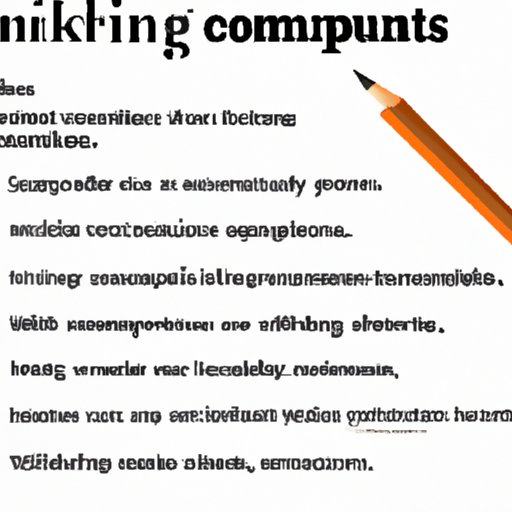Exploring the Basics of Composition Writing
Composition writing is a form of writing that focuses on expressing ideas and opinions about a particular topic or subject. It requires the writer to develop an argument and support it with evidence. Composition writing can take many forms, such as essays, research papers, reviews, or even creative writing pieces. The key goals and objectives of composition writing are to express thoughts and feelings on a given topic, present facts and evidence to support those thoughts and feelings, and to persuade readers of the validity of the argument.
Understanding the Elements of Composition Writing
The most important element of composition writing is creating a strong thesis statement. This should be the central idea or argument that you will be exploring in your composition. It should be clear, concise, and well-defined. Once you have established your thesis statement, you can begin to structure your composition. This involves organizing the ideas and evidence in a logical manner that supports your argument. It is important to develop your argument by presenting evidence and discussing its relevance to your thesis statement. It is also important to incorporate appropriate evidence into your composition, such as quotes, statistics, and expert opinions.
Concluding effectively is another important element of composition writing. This involves summarizing the main points of your argument and reinforcing your thesis statement. It should also provide an overall conclusion that ties all the ideas together.
Developing Your Skills in Composition Writing
To become a better composition writer, it is important to read and research widely. This will help you to gain a better understanding of the topic or subject and provide you with valuable information to use in your composition. Practicing your writing skills is also important. This can involve writing short paragraphs, summarizing articles, or even writing sample compositions. Finally, seeking feedback from others can be beneficial. This could involve getting feedback from family and friends, or even having your work critiqued by a professional editor.

Tips for Crafting a Compelling Composition
When crafting a compelling composition, it is important to identify an interesting topic. Brainstorming ideas can help to generate potential topics and help you to narrow down your choices. Once you have decided on a topic, it is important to use descriptive language to make your composition more engaging and vivid. Finally, editing and revising your work is essential in order to ensure that your composition is error-free and meets the necessary standards.

Common Mistakes to Avoid in Composition Writing
There are several common mistakes that writers should avoid when writing a composition. Poor grammar and punctuation can make a composition difficult to understand. An unclear organization can cause confusion and make it difficult for readers to follow the argument. Lack of originality can make a composition seem uninteresting and dull. Finally, inadequate evidence can weaken the argument and make it seem unconvincing.

Examples of Successful Composition Writing
Analyzing samples of successful compositions can provide insight into how to craft a compelling composition. Identifying common elements used in successful compositions can help you to incorporate them into your own work. Applying lessons learned from successful compositions to your own writing can help you to improve your composition writing skills.
(Note: Is this article not meeting your expectations? Do you have knowledge or insights to share? Unlock new opportunities and expand your reach by joining our authors team. Click Registration to join us and share your expertise with our readers.)
